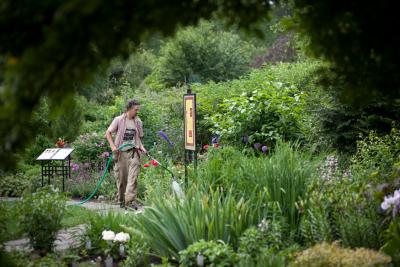Plantations Responds to Drought Conditions
 New York State is experiencing an abnormally dry summer owing to lack of precipitation. The Finger Lakes Region, and Ithaca specifically, is in a “severe drought” as classified by the U.S. Drought Monitor, receiving the lowest amount of rainfall from March to June on record. This is a significant concern for Cornell Plantations because our water source, Fall Creek, is at a record low level.
New York State is experiencing an abnormally dry summer owing to lack of precipitation. The Finger Lakes Region, and Ithaca specifically, is in a “severe drought” as classified by the U.S. Drought Monitor, receiving the lowest amount of rainfall from March to June on record. This is a significant concern for Cornell Plantations because our water source, Fall Creek, is at a record low level.
Cornell Plantations is a living museum of plants that conserves genetic and botanical diversity with a mission to preserve and enhance diverse horticultural collections and natural areas for the enrichment and education of academic and public audiences, and in support of scientific research. Our plant collections are irreplaceable and an invaluable research and educational resource to Cornell, our community, and the global community of plant scientists. For our collections to survive, the plants must receive water. Recognizing the severity of the drought and the need to conserve water, our horticulture and natural areas staff have developed plans to significantly reduce our water use without letting plants die.
Our strategies include those that prevent evapotranspiration or unused water being absorbed into the air. Thus, we are watering in the early morning and late evening when temperatures are lower. At other times, only hand watering directed at root level is used, while sprinklers on timers are used at night. Our staff also employ soaker hoses and water bags to provide irrigation to plants in the botanic gardens and arboretum.
In our natural areas, well-established plants are accustomed to fluctuations in precipitation and, we hope, will to survive this drought. However, within habitat restorations where root systems are not yet well established plants will be more seriously affected and damaged. Therefore, our natural areas stewards are bringing water to priority plants and conserving water around such plants. This involves using landscape fabric to trap water and tree bags.
As the drought continues, Cornell Plantations’ plan to cope with the lack of water is constantly responding strategically as conditions warrant. Our directors of horticulture and natural areas are working closely with Cornell’s Drought Emergency Planning Team on water conservation techniques and identifying alternative water sources, such as water from non-potable water sources and gray water recycling. Our staff have developed a priority plan for continued watering, focusing our efforts primarily on iconic and valuable trees, the long-lived and irreplaceable members of our collections, the botanic garden collections, and newly established native plant communities.
We are taking every step to conserve water and protect our valuable collections. Our staff are working closely with Cornell and City of Ithaca officials to be good stewards of our collections and of our shared water.
Learn more about our efforts in this three-minute interview with Director of Horticulture, Rhoda Maurer.



